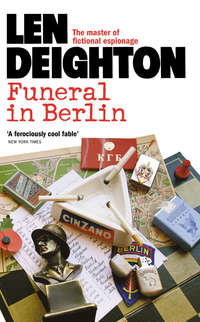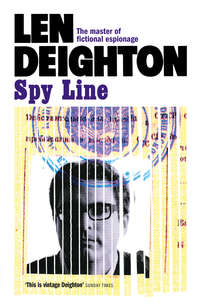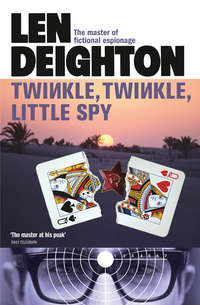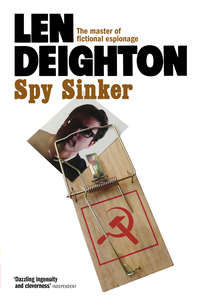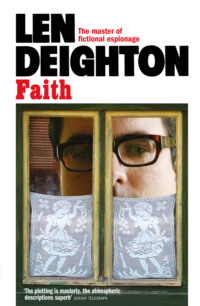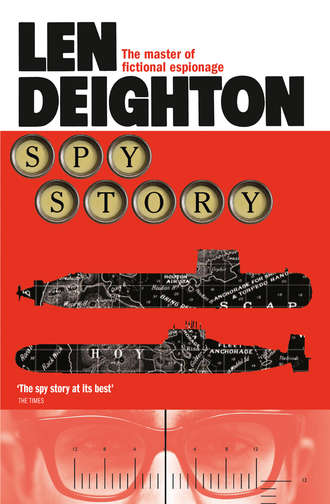
Полная версия
Spy Story

LEN DEIGHTON
Spy Story

Copyright
This novel is entirely a work of fiction.
The names, characters and incidents portrayed in it are the work of the author’s imagination. Any resemblance to actual persons, living or dead, events or localities is entirely coincidental.
Published by HarperCollinsPublishers Ltd 1 London Bridge Street London SE1 9GF
www.harpercollins.co.uk
First published in Great Britain by Jonathan Cape Ltd in 1974
Copyright © Len Deighton 1974
Introduction copyright © Pluriform Publishing Company BV 2012
Cover designer’s note © Arnold Schwartzman 2012
Len Deighton asserts the moral right to be identified as the author of this work
A catalogue record for this book is available from the British Library
All rights reserved under International Copyright Conventions. By payment of the required fees, you have been granted the non-exclusive, non-transferable right to access and read the text of this e-book on-screen. No part of this text may be reproduced, transmitted, down-loaded, decompiled, reverse engineered, or stored in or introduced into any information storage and retrieval system, in any form or by any means, whether electronic or mechanical, now known or hereinafter invented, without the express written permission of HarperCollins e-books.
Ebook Edition © June 2012 ISBN: 9780007458400
Version: 2017-05-23
‘But war’s a game, which, were their subjects wise, Kings would not play at.’
William Cowper, 1731–1800
Table of Contents
Cover
Title Page
Copyright
Epigraph
Introduction
Chapter 1
Chapter 2
Chapter 3
Chapter 4
Chapter 5
Chapter 6
Chapter 7
Chapter 8
Chapter 9
Chapter 10
Chapter 11
Chapter 12
Chapter 13
Chapter 14
Chapter 15
Chapter 16
Chapter 17
Chapter 18
Chapter 19
Chapter 20
Chapter 21
Acknowledgements
Cover designer’s note
About the Author
By Len Deighton
About the Publisher
Introduction
I don’t know how or when I became interested in the history of military uniforms but I remember why. It was because John Edgcombe, manager of the Times Bookshop, told me that collectors of model soldiers were the most expert and dedicated group of military enthusiasts he had ever come across. We met on the third Friday of each month in the Tudor Room of Caxton Hall, London SW1. And my first visit there was a revelation. I didn’t know what model soldiers were until I saw these amazing figures, painted with the skill and detail that I had hitherto associated only with the sort of fine miniature paintings on display in museums.
Copies of The Bulletin, the monthly newsletter of The British Model Soldiers Society, alongside those of the associated Military Historical Society (Saturday afternoons at the Imperial War Museum), still fill a shelf in my library and they go back to January 1959. I have never discarded them because they provide a wealth of information not available elsewhere. I never collected or painted model soldiers but I enjoyed those evenings and it was a member of that group who invited me to a naval war game session.
I expected to see a complicated desk game, perhaps something like three-dimensional chess, which was going through a fashionable phase about that time. In the event I went to one of those grim Victorian-period school buildings that are still to be found in south London. It was Saturday morning and the war gamers had taken over the whole premises for the weekend: ‘war doesn’t stop when it gets dark,’ it was explained to me.
One classroom was occupied by the staff of battle group Red. Another held the staff of battle group Blue. A ‘sentry’ was at the door to ensure that a trip to the toilets did not include a chance to glimpse the gymnasium. For on the floor of the gymnasium model ships, drawn up into two battle fleets, were arranged and constantly moved by monitors. Isolated in the upstairs classrooms, the staffs would only be given information that could come from the crow’s nest of their tallest warship.
The staffs were all at sea but for us spectators, standing around the gymnasium, the whole picture was provided. On the stage a row of chairs gave half a dozen ‘referees’ a place to supervise, observe and declare damage or sinking as the engagement progressed.
I was captivated. This was serious stuff and there were not many smiles or jokes. This was war and I had no doubt that many of those involved in this game knew what the real thing was like. I must have been an incongruous figure at these gatherings. I never painted a toy soldier or participated in any of the war games; younger than most of the others, all I did was ask questions. Fortunately most people enjoy answering reasonably sensible questions that test their expertise so I was accepted. Many years later it was that elaborate war game that provided the starting place and background to a book, and it was naval combat that was in my mind.
I am not in a minority as far as my interest in submarines is concerned. Starting with Jules Verne, there have been dozens of books and movies about the men who brave the claustrophobic tin tubes. Submarines have interested me ever since childhood when I discovered that submarines that carried aircraft really did exist. In the Second World War the Japanese navy had many of them. In September 1942 the submarine I-25 launched a seaplane that dropped incendiary bombs on a forest in Oregon and returned safely back to its submarine.
A more bizarre type of submarine was the steam-driven K Class that the Royal Navy used in the First World War. The difficulties and dangers of reconciling diving under water with the capricious machinery of steam engines surprised no one but the men in the Admiralty; and these submarines were a tragic disaster for those assigned to them.
When in January 1955 the submarine USS Nautilus was underway on nuclear power for the first time, it was a triumph for Admiral Hyman Rickover, one of the most important and prescient men of his century. The conversion of ships and civilian power supply to nuclear energy was largely due to him. In 1959 the USS George Washington, a nuclear-powered (and nuclear missile-equipped) submarine, was launched it was followed by the first nuclear-powered warship and the first nuclear-powered merchant ship in that same year. The following year, 1960, the first nuclear-powered aircraft carrier was launched. The coming of the nuclear-powered submarine completely changed naval warfare, and this joined the nuclear-powered aircraft carrier as the major strategic weapon. In this book I have attempted to give a glimpse of what life was like in the nuclear submarines during the Cold War that sometimes became hot, and when some submarines did not return from patrol
But above all, this is a book depicting the ‘great outdoors’. I have always admired those writers who have a deep and lifelong obsession with nature. I had very little experience of the countryside when I was a child. I grew up in central London so the trips to Wales and to Cornwall, on which my father took us, were exciting expeditions. As a footloose teenager I would frequently splurge on a cheap overnight railway ticket to the Scottish highlands and the region of the great lochs. From that time onwards the rough country that Scotland and Ireland provides was my first choice when on walking holiday. In the 1950s, with an equally foolish fellow-student, I hitchhiked to Edinburgh to be there for New Year’s Eve. Short of money, we pitched a two-man tent each night and more than once awoke to find ourselves buried under a snowdrift. My travelling companion – Bob Hyde – had done his military service in the RAF mountain rescue service so he was rather hardier than I proved to be, but I persevered. In December, northern England becomes dark early. We learned how to pitch our tent in darkness and brewed tea using a tiny Primus stove. One morning we were awoken by the cheers and jeers of young girls. We climbed out of our tent to find we had pitched on the well-kept front lawn of a girl’s boarding school
We had allowed for a week on the road and as the holiday approached traffic became infrequent. One of our early morning lifts was on a lorry, and when we were dropped off at a smart hotel for a hot breakfast the waiter was polite and welcoming. It was only later that day that we realised that the lorry had been carrying boxes of herring and that we both stank of stale fish. I so admired the sang froid of that waiter.
With good luck and good lifts we arrived at Edinburgh’s YMCA in the early evening just in time for New Year’s Eve. But after three flights of stairs carrying my heavy rucksack I dropped down on my bunk, my eyes closed and by the time I awoke it was morning and a New Year. I was an urban creature who had to learn what life was like when devoid of city comforts. It was only as an adult that I came with my family to live in rural areas and saw it season by season at its best and at its worst. Some of my experiences in harsh winter informed the scenes in this book, Spy Story.
Len Deighton, 2012
1
As each bound ends, units cease to be operative until commencement of next bound.
RULES. ALL GAMES. STUDIES CENTRE. LONDON
Forty-three days without a night: six pale-blue fluorescent weeks without a sniff of air, sky, or a view of the stars. I drank in a cautious half-lungful of salty mist and smelled the iodine and seaborne putrefaction that seaside landladies call ozone.
HMS Viking, a deep water anchorage in western Scotland, is no place to celebrate a return to the real world. The uninhabited islands, a mile or more out in the Sound, were almost swallowed by sea mist. Overhead, dark clouds raced across the water to dash themselves upon the sharp granite peaks of Great Hamish. Then, in threads, they tumbled down the hillside, trailing through the stones and walls that had once been a Highland croft.
There were four submarines alongside the one from which I emerged. Out at the anchorage were more of them. The lash of the westerly wind made them huddle close to the mother ships and their crooning generators. The yellow deck lights were visible through the grey mist, and so were the flocks of gulls that screamed and wheeled and shrieked as they fell upon the kitchen garbage.
The wind brought gusts of rain, whipping up crested waves that awoke the subs. Underfoot I felt the great black hull strain against its moorings. The brow tilted. Stepping from the edge of each horizontal fin to the next was easier if I didn’t look down.
Now the next hull groaned, as the same wave sucked and gurgled at its bow. The forecast had been reasonably right for once: overcast, low cloud, drizzle and wind westering. The rain scratched at the slop-coloured sea and crept into my sleeves, boots and collar. My rubber shoe slipped but I recovered my balance. I shook the water off my face and cursed pointlessly.
‘Steady on,’ said Ferdy Foxwell behind me, but I cursed again and built his name into one of the inversions.
‘At least the navy is on time,’ said Ferdy. There was an orange-coloured Ford on the jetty. The door opened and a slim man got out. He was wearing a Burberry and a tweed hat but I knew he’d be the British naval officer from the police office. He bent his head against the rain. The armed USN sentry at the end of the gangway poked his head out of his shelter to check the pass. I recognized the officer as Frazer, a lieutenant. He made his way along the slippery walk towards us, stepping across the gaps with commendable agility.
‘Let me take that.’ He extended a hand, and then smiled in embarrassment as he noticed that the shiny metal case was padlocked to a shoulder-chain under my coat.
‘Help Mr Foxwell,’ I said. ‘He never fastens his.’
‘Neither would you if you had any sense,’ puffed Foxwell. The man squeezed past me and I had a chance to look down at the oily scum, and smell the diesel, and decide that Ferdy Foxwell was right. When I reached the brow – the horizontal fin – of the next submarine I rested the box and looked back. The young officer was bowed under the weight of Ferdy’s case, and Ferdy was stretching his arms to balance his two hundred pounds of compact flab, teetering along the gangway like a circus elephant balancing on a tub. Six weeks was a long time to spend in a metal tube, no matter about sun lamps and cycling gear. I picked up the case loaded with spools and tape recordings, and remembered how I sprinted across these brows on the outward journey.
A red Pontiac station wagon came along the jetty, slowed at the torpedo store and rolled carefully over the double ramps. It continued along the front until turning off at the paint shop. It disappeared down between the long lines of huts. The curved huts were shiny in the rain. Now there was no human movement, and the buildings looked as old as the black granite hills that shone rain-wet above them.
‘Are you all right?’ Frazer asked.
I shouldered the wet case as I started down the companionway to the jetty. The hatch in the sentry hut slid open an inch or two. I could hear the radio inside playing Bach. ‘OK, buddy,’ said the sailor. He slammed the hatch shut as a gust of wind hammered the hut with rain.
There was a panel van behind the Ford. A bad-tempered Admiralty policeman grumbled that we were two hours late and about how the Americans couldn’t make tea. He scowled as he signed for the cases and locked them in the safe in the van. Ferdy shot him in the back of the head with a nicotine-stained finger. Frazer saw the gesture and permitted himself a thin smile.
‘Perhaps a tot?’ said Frazer.
‘I wish I had your job,’ said Ferdy Foxwell.
Frazer nodded. I suppose we all said that to him.
There was the clang of a steel door. I looked at the nuclear submarine that had taken us to the Arctic and back. We civilians were always permitted to leave first. Now there was a deck party assembling forward of the conning tower, or what I’d learned to call a sail. They faced several more hours of work before the sub’s second crew arrived and took her to sea again.
‘Where is everyone?’
‘Asleep, I shouldn’t wonder,’ said Frazer.
‘Asleep?’
‘A Russian sub came down through the North Channel and into the Irish Sea on Wednesday morning … big panic – hunter killers, sonar buoys, County Class destroyers, you name it. Yards of teleprinter. Seventy-two hours of red alert. We were only stood-down last night. You missed the pantomime.’
‘They were frightened it was going to put guns ashore in Ulster?’ Ferdy asked.
‘Who knows what?’ said Frazer. ‘There were two Russian intelligence trawlers and a destroyer off Malin Head, too. You can see they’d be worried.’
‘So?’
‘We stopped Class A Radio traffic for five and a half hours.’
‘And the sub?’
‘They tracked it out past Wexford yesterday afternoon. Looks like they were just taking our pulse.’ He smiled as he unlocked the door of his car. It was well cared for, and all dressed up in black vinyl, Lamborghini-style rear-window slats, and even a spoiler.
‘They’re tricky bastards!’ said Ferdy resignedly. He blew on his hands to warm them. ‘Who said something about splicing that damned mainbrace?’
Frazer got into the driver’s seat and twisted round to unlock the rear doors. ‘It might have been me,’ he said.
I reached under my oilskin coat and found a dry handkerchief to polish the rain off my spectacles. Frazer started the car.
Ferdy Foxwell said, ‘Never mind the dollars and the cinnamon toast and grain-fed steaks … six weeks without a drink: it’s positively unnatural.’
Frazer said, ‘Not all the skippers are as bad as Fireball.’
Ferdy Foxwell settled back into the rear seat of the car. He was a huge man, well over six feet tall and broad enough to carry it. He was in his early fifties but still had enough brown wavy hair to visit a smart barber once a month. But his hair was no more an advert for the barber than were his rumpled suits for his Savile Row tailor, or his curious inability to spell for the famous public school to which he’d also sent his two sons. ‘A drink,’ said Ferdy. He smiled. His crooked, gapped teeth needed only gold wire to complete the image of a mischievous child.
The Admiralty van containing our tapes went at the regulation fifteen miles an hour. We followed at the same pace, all the way to the exit. It was a double compound, with a large check-point at each gate, and the wire twenty feet tall. Newcomers were always told that HMS Viking had been a prison camp during the war but they were wrong, it had been an experimental torpedo testing unit. But it would have done, it would have done.
The dog handlers were drinking hot coffee in the guard tower and the dogs were howling like werewolves. The sentry waved us through. We turned on to the coast road and went down past the housing, the Officers Club and cinema. The streets were empty but the coffee-shop car park was full. The lights of the housing were lost in a flurry of sea mist that rolled in upon us. The Admiralty van continued along the coast road to the airport. We took the high road, climbing steeply up the narrow road that leads to the moors and the pass over the Hamish.
Defoliated by Iron Age farmers, the land is now good for nothing but a few black-faced sheep. This ancient tilted edge of Scotland has only a scattering of poor soil upon the hard granite that does not weather. I felt the wheels hesitate on an ice patch, and ahead of us the higher ground was grey with last week’s snow. Only the red grouse can survive outdoors on this sort of moorland, sheltering under the heather and feeding upon its shoots, moving gently all the time so that the snow does not bury them.
From here the valley formed an enormous stadium, roofed by the hurrying black clouds. Halfway up its steep far side there was a huddle of grey stone cottages smudged with smoke from open fires. One of them was a cramped little pub.
‘We’ll stop for a drink at The Bonnet?’
‘You’ll not get me past it,’ I said.
‘My God, it’s cold,’ said Ferdy, and rubbed the condensation from the window to see how far it was to the pub.
‘There’s the one I’m going to get next year,’ said Frazer. A large light-blue BMW was on the road behind us. It had a left-hand drive. ‘Second-hand,’ Frazer added apologetically. ‘It shouldn’t cost me more than a new one of these. My next door neighbour has one. Says he’ll never buy another English car.’
Cars, politics or climate, for a Scotsman they were English if bad, British if good. Perhaps he sensed my thoughts. He smiled. ‘It’s the electrics,’ he said.
I could hear it now, just a faint burr of the Highlands. It would make sense for the navy to use a local man for this kind of job. Strangers could still find a barrier of silence once the cities were left behind.
Frazer took the hairpin bends with exaggerated care. On one of the turns he stopped, and reversed, to pull tight enough to avoid the snow-banked ditch. But the blue BMW stuck with us, following patiently. Following more patiently than was natural for a man who drives such a car.
Frazer glanced in his mirror again. ‘I think we should,’ he said, voicing our unspoken thoughts, and Ferdy wrote down the registration number in his crocodile-covered note pad. It was a Düsseldorf registration, and even while Ferdy was writing it, the BMW gave a toot and started to overtake.
Whatever was the extent of his intention, he’d chosen his moment well. The BMW squeezed past us in a spray of powdery snow from the drift on our left, and Frazer’s nervous reaction was to swerve away from the flash of light blue and the hard stare of the bearded man in the passenger seat.
The road was downhill and the ice was still hard and shiny up here on the top of the Hamish. Frazer fought the wheel as we swung round – as slowly as a boat at anchor – and slid almost broadside down the narrow mountain road.
We gathered speed. Frazer pumped the brake pedal, trying vainly to snatch at the road. I could see only the sheer drop, down where a clump of firs were waiting to catch us a thousand feet below.
‘Bastards, bastards,’ mumbled Frazer. Ferdy, flung off-balance, grabbed at the seat back, the roof and the sun visor, so as not to grab at Frazer and kill us all.
There was a thump as the rear wheel struck some stones at the road edge, and the tyres for a moment gripped enough to make the differential whine. Frazer was into bottom gear by now, and at the next patch of stones the car whimpered and ceded to his brake pedal enough for him to narrow the angle at which we were sliding. The road was more steeply downhill and the low gear had not slowed us enough to take the steep bend ahead. Frazer hit the horn in two loud blasts before we hit the banked snow that had collected around the edge of the hairpin, like piped icing round a birthday cake. We stopped with a bang of hollow steel, and the car rocked on its suspension.
‘My God,’ said Ferdy. For a moment we sat still. Praying, sighing or swearing according to inclination.
‘I hope you’re not going to do that every time someone tries to overtake,’ I said.
‘Just foreign registrations,’ said Frazer.
Frazer started the engine again. Gently he let in the clutch and the car waddled out of the drift. He took the middle of the road, and at no more than twenty-five miles an hour we went all the way down to the bridge and up the next climb all the way to The Bonnet.
He pulled into the yard there. There was a crunch of gravel and a soft splintering of ice. The BMW was already parked but none of us remarked upon the way its driver had nearly killed us.
‘I’m not sure I’d enjoy it,’ said Frazer, talking of the voyage but studying our faces as if to see the effect the near-accident had had on us. ‘I’m a destroyer man myself … like to keep my head above water.’
I would have described Frazer as an office-boy, but if he wanted to play Long John Silver it was all right by me.
‘Peace time,’ pronounced Ferdy, ‘a submarine trip north is no different to trailing Russians round the Med in an intelligence trawler.’
‘In winter the Med’s a damned site rougher,’ I said.
‘You’re right,’ said Ferdy. ‘As sick as a dog, I was, and I could see that Russian cruiser as steady as a rock all the time.’
‘Your second trip, wasn’t it?’ asked Frazer.
‘That’s right.’
‘Well, you chaps never do more than one a year. It’s over and done with, eh?’
‘Are you buying?’ Ferdy Foxwell asked him.
‘Then it’ll be small ones,’ said Frazer. The wind bit into us as we stepped from the car but there was a fine view. The hills at the other end of the valley obscured the anchorage, but to each side of the summit I could see the Sound and the mist-shrouded islands that continued all the way to the grey Atlantic breakers. The wind sang in the car aerial and tugged at the chimney smoke. We were high enough to be entangled in the fast moving underside of the storm clouds. Ferdy coughed as the cold wet air entered his lungs.


